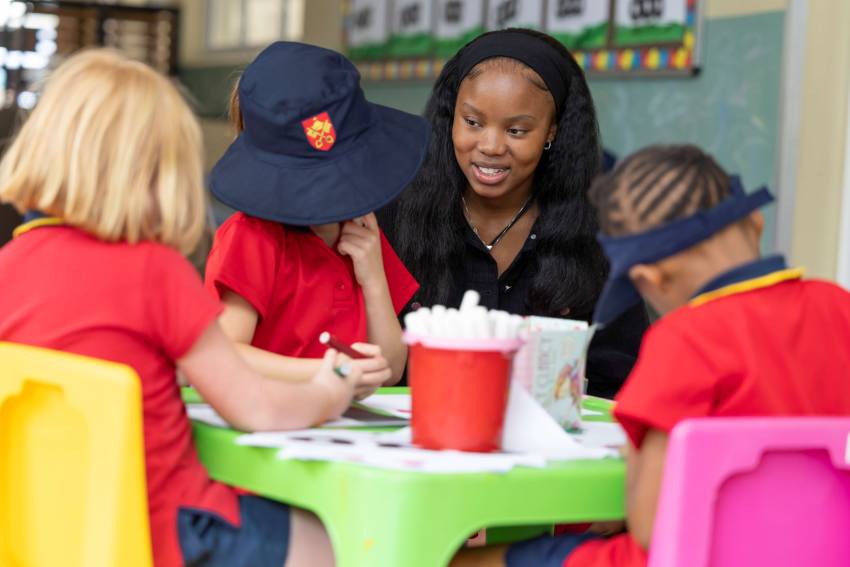Inside the St Peter’s Prep Teacher Intern Programme
As the morning sun slants through the classroom windows at St Peter’s Preparatory School in Sandton, a quiet revolution in learning is taking place. A Foundation Phase teacher stands at the electronic whiteboard, her marker gliding across the surface as she explains a principle of reading and writing with patient clarity. To the side of the room, a young woman sits at a small table, notebook in hand, absorbing the rhythm of the lesson. In a few minutes, it will be her turn to step forward and take over the class. She, too, is a learner, here to answer the calling that has beckoned her since she left school, taking the first step on her dream career in education. At St Peter’s, the art and science of learning unfolds just as powerfully for the university undergraduates who will one day stand at the front of classrooms of their own. Welcome to the St Peter’s Teacher Intern Programme, where a new generation of South African educators is being shaped, one morning, one lesson, one child at a time.
From a quiet start to a bold decision
The story of the St Peter’s Teacher Intern Programme began in 1997, with just a handful of interns and a deep sense of purpose. “As an Anglican school, there’s always been a desire to give back,” says Monica Sloane, Foundation Manager at St Peter’s. “Because our business is education, investing in the development of teachers was the most natural way to do that.”
For many years, the programme remained small, with two or three interns at any given time. But in 2015, backed by research highlighting the critical importance of early childhood education, the School made a bold decision to place an intern in every Foundation Phase classroom. Since then, the programme has blossomed into one of the most dynamic and respected educator development initiatives in South Africa. It currently supports 30 interns, and continues to grow. But as René Levinge-Lang, St Peter’s Teacher Intern Programme Director puts it, it’s not just about the numbers. “It’s about depth,” she says. “We want to develop teachers who are self-aware, resilient, and ready for the complex demands of South African classrooms.”

Growing the whole teacher
The programme’s commitment to personal development is what truly sets it apart. Interns receive a living stipend, access to psychological support, mentoring from staff, and leadership training. “Many of our interns come from challenging backgrounds,” says Monica. “We’re not just helping them become teachers. We’re helping them build better futures.” The psychosocial support is robust, with day-to-day guidance from a head of interns, counselling services through the School’s wellness programme, a psychologist for trauma support, and an external provider who runs self-mastery courses. “We focus on the whole person,” René explains. “Because you can’t teach effectively if you’re not grounded in yourself.” Interns also run a literacy programme at Sefikeng Primary, a school on the grounds of Leeuwkop Prison in Kyalami. “Even as they’re learning, they’re giving back,” says Monica. “It’s humbling and empowering.”
The making of an ideal intern
What makes a standout candidate for the programme? It starts with passion. Applicants must meet minimum academic criteria, an Admission Point Score of 26 with strong English and maths marks. Beyond that, it’s character that counts. St Peter’s looks for individuals who show a commitment to bringing out the best in children, a growth mindset, moral integrity, and emotional intelligence. Interns must be team players, open to feedback, and ready to grow in every possible way.
Learning from each other
The presence of interns at St Peter’s brings tangible, quantifiable benefits to the broader school community. “Most of our mentor teachers have embraced the interns as co-teachers,” says Monica. “It’s been a hugely beneficial growth point for our staff and the children.” The interns, in turn, bring fresh academic knowledge and new energy. “They challenge our thinking,” says René. “They remind us to keep evolving.” The School has developed a formal mentorship programme to support experienced teachers in guiding interns effectively. “It’s not about how many years you’ve taught,” notes Monica. “It’s about self-awareness, mindset, and how you show up in the world.”